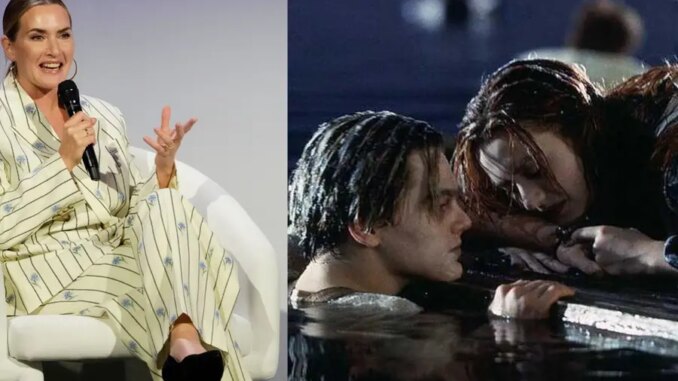
The Unsinkable Truth: Could Jack Have Survived and Kate Winslet's Whisper
The image is etched into the collective consciousness of a generation: two lovers, adrift on the vast, unforgiving canvas of the North Atlantic. One clinging precariously to a floating piece of wreckage, the other, resolute and beautiful, slowly succumbing to the icy maw of the ocean. For decades, the question has persisted, a stubborn splinter in the heart of cinematic lore: Could Jack Dawson have survived Titanic? Could there have been room on that infamous door, a shared salvation for two souls bound by an impossible love? And now, the headline screams, tantalizing and disruptive: "Kate Winslet Finally Reveals Truth."
The allure of this hypothetical survival has fueled countless debates, scientific experiments, and even a Mythbusters episode. Purists argue the physics: hypothermia would have claimed them both, or the buoyancy of the debris simply couldn't support two adults. They point to director James Cameron's adamant declarations that Jack’s death was a narrative necessity, a sacrifice to underscore the film’s central theme of enduring love and the precious fragility of life. Yet, for many, the sight of Rose luxuriating on that ample piece of flotsam while Jack shivers into oblivion feels like a cruel joke, a narrative convenience that defies basic logic and the fervent desire for a happy ending.
But what if Kate Winslet’s "truth" isn’t about the physics at all? What if her revelation isn’t a belated admission of a shared space, but a deeper, more profound insight into the very essence of why Jack had to die?
Imagine her now, years removed from the icy plunge, the ghost of the Titanic still lingering in her eyes. She leans in, a conspiratorial glint, and whispers not of displacement and thermal conductivity, but of the story's soul. "He had to die," she might begin, her voice resonating with the weight of that fictional life, "not because there wasn't room, but because Rose had to live."
This is the true unsinkable truth. Jack’s death was the ultimate act of sacrifice, the crucible in which Rose's transformation was forged. His demise wasn't a plot hole; it was the narrative's beating heart. Without it, Rose DeWitt Bukater would have remained merely Rose, a runaway debutante, perhaps a little wiser, but not the phoenix who rose from the ashes, carrying the fierce, defiant flame of a love that defied social strata and the very ocean itself.
Think of it: Had Jack survived, their love story, while beautiful, would have been merely a grand romance. They might have married, raised children, grown old together. A lovely tale, perhaps, but one lacking the mythic proportions that have allowed Titanic to grip generations. Jack’s death elevated their fleeting connection to an eternal bond, sealing it in the amber of tragedy. He became a martyr for love, a spectral guardian guiding Rose through a life lived fully, loudly, and in defiance of societal expectations – a life lived for them both.
Kate, as the embodied spirit of Rose, understands this intrinsically. She felt the searing grief, the agonizing weight of survival, the imperative to honor his memory by embracing every breath. Her "truth" wouldn't be a scientific correction, but an artistic affirmation. She would speak of the profound choice Jack made – not just to stay in the water, but to choose Rose’s survival over his own. It was a choice born of instinct, yes, but also of a transcendent love that understood the power of a life unburdened by the memory of a shared, desperate struggle on a half-submerged plank of wood.
His sacrifice was Rose’s liberation. It was the moment she truly broke free from the gilded cage of her past, not just from Cal and her mother, but from the very idea of a life dictated by others. Jack gave her not just love, but the audacity to live. He became the invisible anchor that paradoxically allowed her to sail freely, a whisper of "never let go" that echoed in every future decision she made, every wild adventure she undertook, every child she raised.
So, could Jack have physically survived? Perhaps, by some stretch of buoyancy and improbable luck. But for the story to endure, for the love to transcend the silver screen and become a universal symbol of devotion, he could not. Kate Winslet's "truth," then, isn't a debunking of a cinematic choice, but a profound understanding of its necessity. It's the actor’s profound insight into the character’s soul, a whisper that reminds us the most powerful stories aren't always about who lives, but about the immeasurable cost, and boundless beauty, of who dies. Jack's truth lies not in the space on a door, but in the infinite space he carved in Rose's heart, and in ours.